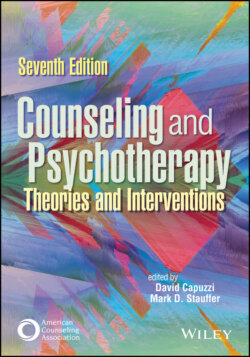Читать книгу Counseling and Psychotherapy - Группа авторов - Страница 104
Sidebar 2.6 Authenticity Exercise
ОглавлениеRCT requires counselors to be both authentic and vulnerable. Self-reflection activities, like this authenticity exercise, are a great way to help better understand your authentic self. Take time to find a quiet place and journal about the following: When was the last time that you felt unable to be your authentic self? What factors influenced your ability to be authentic? Pay attention to any feelings of discomfort in your body as you reflect. Do you feel connected to others when they understand what you are going through?
Recognizing that growth occurs in relationship, RCT counselors focus on creating a therapeutic space in which clients can safely share their experiences and explore their disconnections, including any acute or traumatic disconnections in their lives. It is here that a counselor would honor the strategies of disconnection until safety is restored. Because counseling is a place where clients may share their more vulnerable feelings and experiences, they may also feel increased danger in this setting. For this reason, it is important to recognize that in the midst of building connection, some clients will also experience a need to pull back when they begin to feel comfortable or close. For many clients, wounding occurred in spaces they once deemed safe and at the hands of people they trusted or were supposed to trust. For this reason, working through disconnections and navigating the ebb and flow of therapeutic connection can take time.
Clients come to counseling needing the empathy of their counselors. Despite a counselor’s good intentions and best efforts, therapeutic relationships can experience empathic failures. Reconnecting following these experiences is part of the work of counseling. When empathic failures occur, RCT counselors sincerely express their desire to understand the client and explore the disconnection between them. The counselor follows the client’s lead and supports the timing of the client to enter into this discussion. Other times, counselors may simply see the client withdrawing and stay with the client in whatever context works for the client. Counselors do not challenge, prod, or seek connection during these times of disconnection but instead respect the emotional distance needed by the clients (Jordan & Duffey, 2020).
In those times when counselors do not track clients’ feelings or thoughts in ways that resonate with them, they can acknowledge the disconnect. Counselors enter the profession of counseling because they want to help and make a difference. However, their own validation for being an effective or relational counselors cannot come at the expense of the clients’ needs to be heard. In this respect, the counselors’ egos cannot supersede their clients’ needs. If counselors are not aware of their ego needs, they will be less likely to engage in the growth-fostering relationship that counseling requires (Jordan & Duffey, 2020). Interactions in relationships in which mutual empathy and mutual empowerment do not occur usually involve disappointment; a sense of being misunderstood; and sometimes a sense of danger, violation, or impasse.
